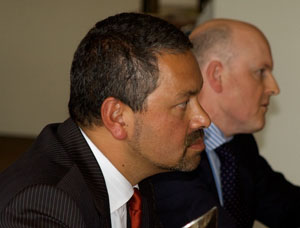Pricing, laws key to Optus NBN deal

Optus director of government and corporate affairs Maha Krishnapillai has said the telco cannot agree to any deal to sign customers up to the National Broadband Network (NBN) until it knows how the network will take shape.

Maha Krishnapillai (Credit: David Braue/ZDNet Australia)
Speaking to Radio 2UE's Latika Bourke this morning, Krishnapillai rejected a report last week in the Australian Financial Review that stated a deal with NBN Co was nearing completion.
"It's quite premature for us to say what we'll be doing without HFC network or in fact indeed what we'll do with the NBN. We've just had a return of the Federal Government so we've only just had confirmation that the NBN is going ahead," he said. "We still need to get information on pricing and what price models will be available for us to transit customers potentially across onto the new NBN Co."
Krishnapillai said that part of the delay in making any formal deal similar to the $11 billion Telstra arrangement was because the telco needed more certainty through industry regulatory reform. The legislation surrounding the reform of the telecommunications industry, the Telecommunications Legislations Amendment (Competition and Consumer Safeguards) Bill 2009, is due to be entered into parliament in the next few weeks.
In the meantime, Krishnapillai said discussions with the network wholesaler NBN Co were continuing.
"We're in discussions with NBN Co on a whole raft of issues from everything from pricing models, from the undertaking they have to put into the ACCC, from provisioning systems, to fault handling, to intercept, to operating systems, etcetera etcetera," he said. "It's very premature to think we'd be in any way close to signing some sort of deal with NBN Co when we don't really know what NBN Co will look like."
"When we know what NBN Co will look like, we will work very hard with the government and NBN Co to work out a logical and orderly transition to the new NBN world."
Krishnapillai also took aim at those in the telco industry who believed that wireless was a legitimate alternative to the NBN.
"I must say there's an awful lot of ill-informed speculation around these sort of issues. Even from people who don't own wireless networks about what wireless can possibly do," he said. "The reality is we own the second biggest wireless network in the country. We know and are absolutely committed to wireless and particularly mobility as a future complement to fixed networks in this country.
"Anyone who has followed this sector for any period of time knows that fibre has significant advantages in terms of direct dedicated one-to-one type communication rather than a shared wireless network. But we're absolutely convinced that a wireless network will be an essential complement in fact to an NBN. So we strongly support it but it is not going to take the place of a fibre future."
This was not a sentiment reflected in a speech delivered by Shadow Communications Minister Malcolm Turnbull at the annual CommsDay Congress event in Melbourne this morning.
"We have just heard from Bevan Slattery, one of the authors of the Alliance for Affordable Broadband paper, which include some of our most experienced telco CEOs, and their contention is 'We believe that next-generation 4G technologies are the best fit for purpose for the vast majority of consumers and SOHO clients currently without other broadband delivery options'," Turnbull said.
"Likewise, the largest new national broadband initiative in the United States at present is the US$7 billion LightSquared project to build a nationwide 4G wireless broadband network to provide up to 100Mbps peak speed connectivity," he added. "The Coalition does not believe that wireless is the only answer to access shortcomings — but we do argue it is a real option for many people, that its next evolution will involve much higher speeds, and that to dismiss it as a non-contender is hardly credible."